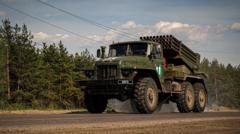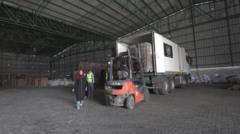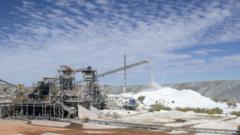**The situation is complex, involving a recent ceasefire, international diplomatic responses, and the precarious balance of power between Israel and Hezbollah.**
**Escalation of Tensions: Israel Strikes Beirut Amid Ceasefire Concerns**

**Escalation of Tensions: Israel Strikes Beirut Amid Ceasefire Concerns**
**Israel's airstrike on Hezbollah targets in Beirut's southern suburbs raises alarms over a potential return to conflict and escalates tensions in the region.**
Israel conducted an airstrike on the southern suburbs of Beirut on Sunday, targeting a building allegedly used by the Iranian-backed militant group Hezbollah. This airstrike, which came after an evacuation order was issued, raises significant concerns regarding the recent ceasefire established five months prior. Israel insists that the strike was aimed at a specific Hezbollah site believed to stockpile "precision-guided missiles" deemed a direct threat to Israeli security.
In condemnation of the strike, the Lebanese presidency has called for intervention from the United States and France, both of whom are key players in the October ceasefire negotiations. They urged these nations to compel Israel to halt its recent military actions, citing concerns that the ongoing strikes could further destabilize the region. This is particularly pertinent as reports indicate that while Hezbollah has largely complied with the truce, Israeli forces have engaged in nearly daily operations against what they claim are Hezbollah-related sites.
Live reports captured dramatic visuals of heavy smoke billowing from the strike site shortly after the evacuation notice was given by Israeli authorities. Fortunately, as per reports from Lebanon's Civil Defence, there were no casualties, and firefighting efforts were deployed promptly.
Israeli officials reiterated their stance that Hezbollah's missile storage activities constitute a severe violation of the ceasefire agreements made between Israel and Lebanon. They emphasized that the Dahiyeh neighborhood will not be considered secure for Hezbollah operations. Israel's Prime Minister Benjamin Netanyahu made it clear that any endeavors by Hezbollah to bolster their capabilities will not go unchallenged.
The international community showcased its discontent through UN Special Coordinator for Lebanon, Jeanine Hennis-Plasschaert, who voiced concerns about renewed violence arising from such military engagements. She advocated for all parties involved to refrain from actions that may jeopardize ongoing peace efforts.
Earlier this month, an Israeli airstrike in the same area resulted in four fatalities, including a Hezbollah official, further complicating the already tense situation. As schools and communities in Beirut grapple with the lingering fear of escalating conflict, the fragile peace achieved by the recent ceasefire remains under significant threat.
In condemnation of the strike, the Lebanese presidency has called for intervention from the United States and France, both of whom are key players in the October ceasefire negotiations. They urged these nations to compel Israel to halt its recent military actions, citing concerns that the ongoing strikes could further destabilize the region. This is particularly pertinent as reports indicate that while Hezbollah has largely complied with the truce, Israeli forces have engaged in nearly daily operations against what they claim are Hezbollah-related sites.
Live reports captured dramatic visuals of heavy smoke billowing from the strike site shortly after the evacuation notice was given by Israeli authorities. Fortunately, as per reports from Lebanon's Civil Defence, there were no casualties, and firefighting efforts were deployed promptly.
Israeli officials reiterated their stance that Hezbollah's missile storage activities constitute a severe violation of the ceasefire agreements made between Israel and Lebanon. They emphasized that the Dahiyeh neighborhood will not be considered secure for Hezbollah operations. Israel's Prime Minister Benjamin Netanyahu made it clear that any endeavors by Hezbollah to bolster their capabilities will not go unchallenged.
The international community showcased its discontent through UN Special Coordinator for Lebanon, Jeanine Hennis-Plasschaert, who voiced concerns about renewed violence arising from such military engagements. She advocated for all parties involved to refrain from actions that may jeopardize ongoing peace efforts.
Earlier this month, an Israeli airstrike in the same area resulted in four fatalities, including a Hezbollah official, further complicating the already tense situation. As schools and communities in Beirut grapple with the lingering fear of escalating conflict, the fragile peace achieved by the recent ceasefire remains under significant threat.




















